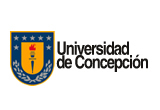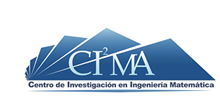Graduate Thesis of Jessika Camaño
 | Program | PhD in Applied Sciences with mention in Mathematical Engineering, Universidad de Concepción |
|---|---|---|
| Enrollment Year | 2009 | |
| Senior Year | 2013 | |
| Thesis Title | Finite Element Methods for Problems in Bioelectromagnetism | |
Thesis Summary:The main goal of this thesis is to propose, test and analyze mathematical and computational efficient models for the localization of brain activity from measurements of the electric and magnetic fields on the surface of the head. These measurements can be obtained using electroencephalography or magnetoencephalography. In mathematical terms, this thesis focus in the study of an inverse problem. First, we consider the inverse source problem for the eddy current approximation of Maxwell equations. We show that as for the full system of Maxwell equations, a volume current source cannot be uniquely identified by the knowledge of the tangential components of the electromagnetic fields on the boundary, and we characterize the space of non-radiating sources. On the other hand, we prove that the inverse source problem has a unique solution if the source is supported on the boundary of a subdomain or if it is the sum of a finite number of dipoles. We address the applicability of this result for the localization of brain activity from electroencephalography and magnetoencephalography measurements. Afterwards, we analyze the electrostatics problem with a current dipole source. This is a singular problem, since the current dipole model involves first-order derivatives of a Dirac delta measure. Its solution lies in Lp for 1 ≤ p < 3/2 in three dimensional domains and 1 ≤ p < 2 in the two dimensional case. We consider the numerical approximation of the forward problem by means of standard piecewise linear continuous finite elements. We prove a priori error estimates in Lp norm. Then, we propose a residual-type a posteriori error estimator. We prove that it is reliable and efficient; namely, it yields global upper and local lower bounds for the corresponding norms of the error. Finally, we use this estimator to guide an adaptive procedure, which is experimentally shown to lead to an optimal order of convergence. Subsequently, we compare different approximation methods for the solution of the direct problem in the case of a domain with several regions with different conductivities. For the direct problem, we analyze the case in which the dipole is located at an interface between two regions with different conductivities. In this specific case we use an approximation of the delta function since other methods are not defined in this situation. On the other hand, for the inverse problem, we analyze the results obtained using the previous methods and one last method that incorporates an adaptive procedure guided by the a posteriori error estimator found in Chapter 4. Two situations are considered: a source located within a homogeneous region and the case where the source is close to an interface. We study also the case of a distributed source and we compare the lead field matrices when the support of such source is located within a homogeneous region and when its support is close to an interface. Finally, the three-dimensional eddy current time-dependent problem is considered. We formulate it in terms of two variables, one lying only on the conducting domain and the other on its boundary. We combine finite elements (FEM) and boundary elements (BEM) to obtain a FEM-BEM coupled variational formulation. We establish the existence and uniqueness of the solution in the continuous and the fully discrete case. Finally, we investigate the convergence order of the fully discrete scheme. | ||
| Thesis Director(s) | Ana Alonso-Rodríguez, Rodolfo Rodríguez, Alberto Valli | |
| Thesis Project Approval Date | 2010, December 07 | |
| Thesis Defense Date | 2013, June 17 | |
| Professional Monitoring | Postdoctoral research at the Center for Research in Mathematical Engineering (CI²MA): June 18 - December 31, 2013. | |
| PDF Thesis | Download Thesis PDF  | |
ISI Publications from the ThesisAna ALONSO-RODRIGUEZ, Jessika CAMAñO, Rodolfo RODRíGUEZ, Alberto VALLI: Assessment of two approximation methods for the inverse problem of electroencephalography. International Journal of Numerical Analysis and Modeling, vol. 13, 4, pp. 587-609, (2016). Ana ALONSO-RODRIGUEZ, Jessika CAMAñO, Rodolfo RODRíGUEZ, Alberto VALLI: A posteriori error estimates for the problem of electrostatics with a dipole source. Computers & Mathematics with Applications, vol. 68, 4, pp. 464-485, (2014). Jessika CAMAñO, Rodolfo RODRíGUEZ: Analysis of a FEM-BEM model posed on the conducting domain for the time-dependent eddy current problem. Journal of Computational and Applied Mathematics, vol. 236, 13, pp. 3084-3100, (2012). Ana ALONSO-RODRIGUEZ, Jessika CAMAñO, Alberto VALLI: Inverse source problems for eddy current equations. Inverse Problems, vol. 28, 1, 015001 (24pp), (2012). |
||
<< Back to list of Graduate Thesis.

